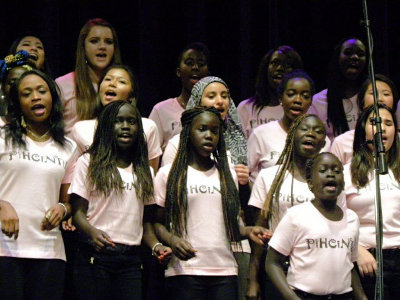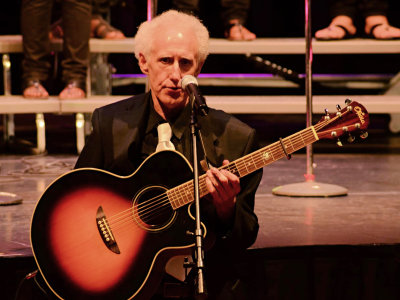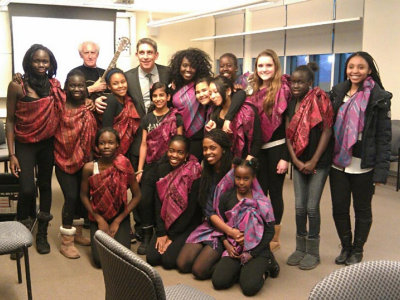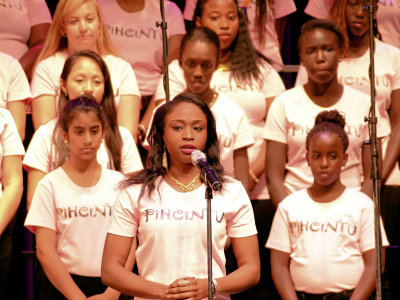
Music With Older Kids
Hearts and Voices of the Pihcintu Chorus
An Interview with Con Fullam
by Sally Rogers
I happened upon the Pihcintu Multicultural Chorus in Portland, Maine while researching community choruses across the country. It was founded ten years ago by songwriter Con Fullam to provide newly arrived immigrant and refugee children with a place to sing about peace and justice and to socialize with young people of similar backgrounds from around the world. The chorus has as many as thirty singers from seventeen countries and has sung at the Kennedy Center and the United Nations. I was deeply touched by Fly Little Birds Fly, which addresses the “tragic loss of lives taken by senseless school shootings across America” and thought the Children’s Music Network community would be interested in a closer look at Fullam’s work with these inspiring young singers.
Sally Rogers: I ran across your Pihcintu Chorus when I was writing an article about community choruses for the Orff Echo. My jaw dropped when I listened to the videos of the girls singing. Then I read about their life stories and was humbled by their strength and courage. I am in awe of what you are doing up there in Maine! What was the great “a-ha moment” that made you start the Pihcintu chorus?
 Con Fullam
Con Fullam
Con Fullam: It began ten years ago on a very cold, wet Saturday in November when we held our very first auditions at Reiche Elementary School in Portland, Maine.
So it is an auditioned chorus?
Yes, it is; however, I turn very few away due to voice quality. It’s really about who they are, what their commitment is to the group, and what they feel they can bring to the chorus other than their vocal talents. I’m not looking for the next Beyoncé. I’m far more interested in who these kids are at their heart.
And what they want to say.
Sure. Portland has a huge refugee resettlement program that goes back many, many years. You see them on the street all the time, without necessarily making the connection.
I read that Portland has over 2,000 refugees from Sudan alone, plus many from other places in the world.
Yes, and you can tell where the latest conflagration is in the world by who the new arrivals are. For instance, at this particular moment in time I’m getting a lot of kids from Burundi, some from Afghanistan, and a number of Iraqis. But due to what’s happening now, I fear that refugees from those areas will be cut off.
Have you gotten any Syrian refugees?
No. The truth of the matter is that it takes over two years to get cleared to enter the United States.
The United States is not an easy entry by any stretch of the imagination, unlike what you might hear from the pundits.
No, not at all. It’s as far from the truth as you can get. Refugees are battered left and right for at least two years. As I’ve said often, the very first thing you lose when you come to a foreign country is your voice. Quite literally.
If you can’t speak English, you’re stuck.
Exactly. Having worked with Catholic Charities, it became wildly apparent to me what a rich cultural gift these people were to the whitest state in the Union. I found that the chorus was a fascinating way for kids to learn English phonetically. A couple of years ago I had a young woman from Darfur who was recommended to me by one of the English as a Second Language (ESL) programs here. She had just arrived and spoke nothing but Arabic, but loved to sing. Within three weeks, she called me up one night and sang all the songs to me over the phone, which was a very touching moment. Even though she wasn’t entirely aware of what she was singing, she sounded lovely. From that point on, over the course of six months or so, I saw such incredible progress being made. It’s amazing how resilient and how quick and sponge-like these kids are.
 With poet Richard Blanco
With poet Richard Blanco
I read that Reiche School, where you audition your singers, has the largest immigrant population in Portland.
That’s an interesting question. Deering High School now is bordering on a 49 to 51 percent immigrant student body, students of color and various creeds and cultures. Portland High School is not far behind. King Middle School close to that. A number of the schools here in Portland now are very integrated.
What ages are your singers?
They’re age ten and up. I have some folks in the chorus who have literally been in the group for nine years. They’re now in college, and in a few cases, graduated from college, and are still singing with us.
Are all of the singers in your chorus immigrants or do you take non-immigrants as well?
We’re all immigrants!
Okay, recent immigrants…
I have a couple of Caucasian kids who are here for that very purpose. One of the things that this chorus addresses, and that we all need to remember, is that we ARE all immigrants, unless you happen to be Native American. That is lost on all too many people these days. Historically, I’m Irish. My grandfather came over here mainly because they were going to hang him if he stayed in Ireland. He felt the sting of prejudice when he saw the signs, “No Irish Need Apply.” A couple generations later, the Irish were assimilated and the next wave of immigrants came. The Irish were among the first to kick the ladders out. And that’s what we’ve been doing ever since the first wave of immigration, whether we’re Irish, Polish, German, Jewish. It doesn’t matter. We’re doing it now.
Absolutely. Have you read Ronald Takaki’s book, A Different Mirror, about the history of immigration?
No. I’ll write that down right now.
It’s probably the best summary of the history of US immigration I’ve ever read, and it says in 600 pages what you just summarized in a few words! The stories of the people are very interesting, both in terms of what they left and what they found and experienced when they arrived here. It mirrors exactly what we are seeing now, with the anti-immigrant rants across the country.
It’s just blatant, outright fear-mongering, and unfortunately, fear is a very powerful emotion. Some people are very good at playing on people’s fear, Trump being a classic example. You can do scary stuff and a lot of damage in a very short period of time.
That’s for sure. It’s quite frightening. In my reading about the immigration situation in Portland as it pertains to your chorus, I found an online conversation between several people about the immigrants in Portland, comparing Lewiston and Portland in terms of racist immigrant backlash. The lack of understanding of the immigrants’ plight, the echoing of media hype, and no apparent understanding of the bias held by the writers was shocking to me.
Lewiston is suffering significantly under the weight of Somali immigration and also the lack of employment in desperate economic times.
How far are you from Lewiston?
It’s about twenty-five minutes from my doorstep. Again, it’s fascinating, because if you look at the Lewiston situation, the immigrants are revitalizing the area of downtown that was devastated when the mills shut down. When the mills left, Lewiston-Auburn, which was entirely a manufacturing city, fell apart.
And now immigrants are beginning to put it back together?
Yes, they’re coming in and opening up little restaurants and shops. They’re doing all the things that immigrants do. They’re trying to better their lives.
In the online conversation I read, the comment was made, “Well, these aren’t REAL immigrants. They didn’t come here from Somalia. They came from Atlanta and now are joining families here. They’ve been in this country for a while, and now they are here taking our jobs and using up our resources.”
That is true. Portland and Lewiston get a lot of immigrants who first landed in Atlanta and found it to be completely intolerable. You can imagine landing in Atlanta, being Somalians, and speaking only Arabic. It’s untenable.
So then they look for other places to live, and Maine has been unusually welcoming to people of color, even though it is the whitest state in the nation!
It doesn’t take long for the word to get out, which is why the population of Somalis grew so quickly in Lewiston. That was the issue—that so many came so quickly, which was overwhelming to a lot of the systems there.

Are any of the Lewiston immigrants in your chorus?
One of my greatest challenges is transportation. It’s not like a nice little community chorus where the moms drop off the kids and come back to pick them up an hour later. That’s not how it works. Parents of my kids are working or they don’t have cars. Very fortunately, the Portland Housing Authority, where many of my kids live, has a bus and they’ve given me the bus. I’m the bus driver as well as the director. Since it’s only a fourteen-seat bus, I don’t need a special license to drive it. I have one parent who helps. I rehearse in an area called Kennedy Park, where a lot of my kids live, so they can walk. And when we perform (and we do a lot of that), I have to rent two fourteen-seater vans and a parent.
Are you making any CDs of your songs?
Yes, we have a CD out called Music for the World: Pihcintu Multinational Chorus. I’m about to finish up mastering the CD of the show we did live at the Kennedy Center.
Now, how did you come to name the chorus? I read that it is a Passamaquoddy word.
When I first founded the chorus, I tried to come up with a name that in some shape or form spoke to the mission of the group. But every name I came up with, I discovered, had already been taken by somebody else. So in a fit of pique, I went to the Portland Public Library, got out the Passamaquoddy dictionary, and I looked up the word “sing.” There I found the word “pihcintu,” which means “when she sings, her voice carries far.” And so Pihcintu was born.
So are there any Passamaquoddy speakers still around?
Yes, there are. There’s a big movement up here amongst the Micmac, the Passamaquoddy, and the Abenaki tribes to keep the languages alive. I would love to find a Native American who would like to be part of the chorus. I just haven’t found anyone in town yet. Again, that always boils down to transportation.
And time. It must be really hard to hold the chorus together while you are also trying to make a living.
Yes, that’s always one of my larger issues. I have a production company, a series on PBS, and a series up here. I created a few characters called Wompkees. I have two movies in fifty countries. If you Google them, they come up all over the place!
On one of the videos on your website, the news anchor made a call for people to make donations to the chorus. How did that pan out?
Oh, you’re talking about the concert we did for the governor’s inauguration a while ago. I don’t recall specifically from that airing. But we get a lot of support through foundations now. I got nothing for many years. I was sort of the financier and the player. But I’ve finally found a great grant writer and realized that the art of grantsmanship is an art indeed! If you are not one of those artists, then you can go for a very long time getting nothing, which happened to me. In my humble opinion, it’s form over content in grant writing. If you don’t understand the form, then the content doesn’t matter!
So you’ve had better luck of late with funding, it sounds like. How do you go about getting publicity for your organization? Your website has a number of television clips that must have been very helpful.
The Today piece was a groundbreaker for us. It’s obviously a very prestigious show and they came up here and spent the whole day filming. Then they gave us close to a five-minute piece on the air. Voice of America did a piece that went all over the world.
Did that help you to get funding, either directly or indirectly, as a result of the programs?
Well, not directly, because there was not a call to action. But people like to donate to high-profile, successful organizations. And because we received all this national and international attention, I knew it made a difference in boardrooms and in places where these decisions are made.
I’d like to go back to the nuts and bolts of the chorus: your rehearsals, repertoire, and planning. How often do you meet?
We meet every Monday for a couple of hours. Part of that time is devoted to snacks and socializing. Because they go to different schools, a lot of these kids don’t get to see each other otherwise. So it’s a social time, and also if I don’t feed ’em, I get nothing out of ’em at that hour!
I have a small chorus, too, of the type that you described, with parents who bring their children and pick them up. Snack is key! They won’t come if you don’t have a snack. I understand that you compose most of the material the chorus sings, and the kids write some of the songs as well. What is your history in the music world?
I’ve been nominated for a couple of Emmys. My background is as a singer-songwriter and a pen-for-hire. For twenty years I toured and recorded for Epic Records. I wrote for most of the major publishers at one time or another: MCA, Universal, Chapel, and BMG.
Are you still doing that to pay the bills?
Yes. I also write a bunch of stuff for the kids. Most of the stuff we sing, I compose, or someone I know wrote it. And yes, that’s what I do. I’m a songwriter. You don’t ever stop doing that, I guess. It’s very liberating to be writing for myself and not a company. I can write what I wish to write.
But you also get the girls to write. There was a beautiful poem by Eclas Ahmed.
She is a very powerful young woman. She is a force of nature!
Do you incorporate the poetry in the concerts as well?
Yes. She does that piece. In terms of the girls’ writing, the only one we are performing at the moment is one that I co-wrote with Judith Abdullah, who literally was one of those kids on that cold November day ten years ago. She has an astounding backstory. Her mother was a child bride and was abducted into the Sudanese army. She escaped with her children and carried three of them across the desert to Egypt with five bullet wounds in her body. Judith is now a graduate of the University of Southern Maine and is working as a grief counselor. No one could be better suited to do that than her. The great part is to watch the success stories that have come out of this chorus. I’m certainly not suggesting in any way, shape, or form that it was the chorus that did it, but most of my kids have gone on to college. There’s a very high success rate in that area, and a lot of them are coming out and doing wonderful things.
That’s amazing, especially considering they are all ESL students.
Going back to the songwriting, how do you work with the girls to write the songs? Is it during your rehearsals or do you get together later? Do they hand you words that you set to music, or what exactly happens?
It really has to be more of a one-on-one situation, and I’m just starting to do more of that now. My focus is this chorus representing the immigrant experience to audiences in a way that really only they can. We’re starting to integrate more of the kids’ stories into the concerts. It’s incredibly important for the audience to hear that these are not just people who come over here to collect welfare. They are classic immigrants. They came here for a better life. Their parents are working hard. They are working hard. The parents are consistently insistent, constantly vigilant about their kids’ success in school. And that’s why there is such a high rate of success in college for these kids. That’s what being here is all about for these families. The parents want their kids to have a better life than they had.
And most of them sat in refugee camps for years before they ever got a chance to start their new lives here.
Yes, many of them did. They came from the camps in Ethiopia, Uganda, and Egypt. (Listen to some of their stories, recorded by the UNHCR)
Do they mostly come through an organization like Catholic Charities? They must have to have some sort of sponsorship.
A lot of them are asylum seekers and are over here on a limited run. They have to find their way or go back. That’s becoming more and more difficult by virtue of what’s going on here. I’m not sure what the breakdown between green card and asylum seekers is. It’s probably quite a mix. Obviously, sponsorship is a big part of that, and Catholic Charities plays a big role.
Is there anything else you’d like to share with our CMN members about upcoming plans and projects?
Right now, there are our concerts and a collaboration with the Portland Symphony Orchestra in April around John Williams’ compositions. We’ve been invited to Washington Serenade, a five-day event in Washington, DC where choruses from around the world come together to sing for each other and with each other. The girls have been offered full scholarships, so now I’m raising the rest of the money to get them there. The invitation is there. They’ll have a busy season coming up. And we just finished a very busy one that started with a show for the United Nations, which included the challenge of taking thirty-four girls to New York City. We stayed over for three days. We performed in front of 3,000 people for an event called Under One Sky, which was an international event that started at the Sydney Opera House in Australia, traveled around the world, and ended up at Dag Hammarskjold Plaza. Basically, it was about global poverty.
Sounds like last year’s successes have paved the way for another full year for your chorus. Thank you so much for spending this time with CMN.